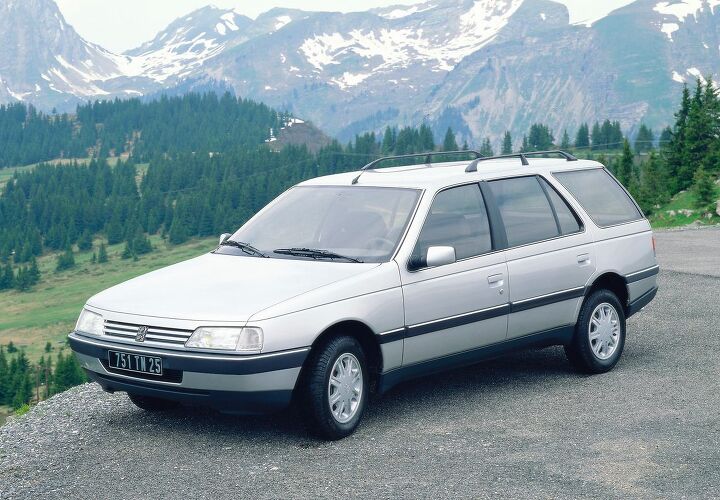France's Charge Back Into the U.S. Market to Be Led by Former Nissan Executive

France’s PSA Group appears to be getting serious about its re-entry into the U.S. market, naming former Nissan executive Larry Dominique as the head of its North American endeavors. That means the possibility of seeing new Peugeots or Citroëns on the road is no longer just a pipe dream.
However, PSA hasn’t yet made up its mind on which brands will debut in America. The Peugeot lineup makes the most sense, as it’s the French brand most American’s actually still remember, but Citroen has more eccentric models that could appeal to a specific subset of customers. The latter also has the DS sub-brand that might appeal to upscale buyers, even if it were to come in on its own.
The final decision won’t come until PSA has spent time and money performing loads of consumer research and logistical analysis.
“This is a market that, as a full-line automaker, you need to be part of,” Dominique told Automotive News in a phone interview yesterday as he scouted U.S. cities for the future company headquarters. “But this is a 10-year project. It’s not about jumping in and creating market share as quickly as possible.”
Dominique, 54, will be senior vice president for the newly minted PSA North America and placed in charge of returning the automaker to the U.S. for first time since 1991 — the year Peugeot pulled up stakes and left town.
“The reality is that Peugeot as a brand left the United States 26 years ago,” he said. “The marketplace is so different today. What happened back then — what went right, what might have gone wrong, the reasons for the exit — to me are irrelevant now. The brands themselves, the vehicles that PSA produces are so different than their positioning back then.”
The comeback will be anything but traditional, however. Last year, PSA CEO Carlos Tavares suggested the company would probably re-enter the U.S. as a mobility company first, offering ride-hailing and car-sharing services in French vehicles. While bringing your introductory fleet in as taxis doesn’t sound like a great way to develop intrigue, offering ride-sharing could be a good way to acquire feedback and get potential buyers interested in your wares. General Motors and Mercedes-Benz are both taking similar approaches with their own rent-a-car programs.
Eventually, PSA does want people purchasing its cars, though it Dominique has declined to say if the plan is to do that through a dealership-based distribution network or not. He did specify that the goal was not to have PSA enter the U.S. within ten years, but to have it be well-established by that date.
“It’s going to be a significant amount of money to re-enter the market,” he said. “But we haven’t set a number … If we can find more efficient ways to market and sell our vehicles — whether it’s in a traditional partnership with investors or not — those are things that can heavily influence the cost of coming to market.”
[Image: PSA Group]

A staunch consumer advocate tracking industry trends and regulation. Before joining TTAC, Matt spent a decade working for marketing and research firms based in NYC. Clients included several of the world’s largest automakers, global tire brands, and aftermarket part suppliers. Dissatisfied with the corporate world and resentful of having to wear suits everyday, he pivoted to writing about cars. Since then, that man has become an ardent supporter of the right-to-repair movement, been interviewed on the auto industry by national radio broadcasts, driven more rental cars than anyone ever should, participated in amateur rallying events, and received the requisite minimum training as sanctioned by the SCCA. Handy with a wrench, Matt grew up surrounded by Detroit auto workers and managed to get a pizza delivery job before he was legally eligible. He later found himself driving box trucks through Manhattan, guaranteeing future sympathy for actual truckers. He continues to conduct research pertaining to the automotive sector as an independent contractor and has since moved back to his native Michigan, closer to where the cars are born. A contrarian, Matt claims to prefer understeer — stating that front and all-wheel drive vehicles cater best to his driving style.
More by Matt Posky
Latest Car Reviews
Read moreLatest Product Reviews
Read moreRecent Comments
- Carson D I thought that this was going to be a comparison of BFGoodrich's different truck tires.
- Tassos Jong-iL North Korea is saving pokemon cards and amibos to buy GM in 10 years, we hope.
- Formula m Same as Ford, withholding billions in development because they want to rearrange the furniture.
- EV-Guy I would care more about the Detroit downtown core. Who else would possibly be able to occupy this space? GM bought this complex - correct? If they can't fill it, how do they find tenants that can? Is the plan to just tear it down and sell to developers?
- EBFlex Demand is so high for EVs they are having to lay people off. Layoffs are the ultimate sign of an rapidly expanding market.


































Comments
Join the conversation
Yes, because Fiat and Alfa have proven how successful failed European brands can be when they re-enter the US market. It's got success written all over it. Taxi !
The Peugeot 405 pictured looks decent for car that debuted 30 years ago. If only it were brown. It's produced to this day under license outside of France. As to the appeal of European cars in the US, well, there isn't much, and vice versa. The most popular car in the US is the Ford 150, virtually non-existent in Europe, where in 2016 the best selling cars were the VW Golf and the Renault Clio in Germany and France respectively.